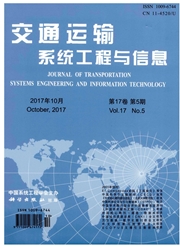

 中文摘要:
中文摘要:
选取1978–2012年的数据,应用交叉效率数据包络分析法(Cross-efficiency DEA)和向量自回归模型(Vector Autoregression,VAR)对中国现代交通运输业的效率波动情况及其影响因素进行分析.研究结果表明,交通运输业的投入和产出要素之间,均存在单向格兰杰(Granger)因果关系;交通运输业的效率波动可以划分为效率上升、高效运行和效率下降三个阶段,总体上呈现出“先升后降”的趋势;交通运输业对人均消费、政府支出、能源消耗和固定资产投资的冲击均表现出正向为主的响应,对劳动的冲击表现出负向响应,而对信息的冲击则表出响应“滞后”.
 英文摘要:
英文摘要:
In order to explore the efficiency volatility and influence factors of Chinese modern transportation industry based on the data from 1978 to 2012, the Cross-efficiency DEA and VAR model are adopted. The result proves that, one-way Granger casualty relationship exists, respectively, between the input variables and output variables; the efficiency volatility of modern transportation can be divided into three stages:efficiency improvement, high efficiency operation and efficiency loss, which shows the trend of“rising first, then falling”in general; the response of transportation industry to the shock of per capita consumption, government spending, energy consumption and fixed-asset investment are positive, while to the shock of labor factor is negative, what’s more,“lag effect”exists in the response of transportation industry to the shock of information element.
 同期刊论文项目
同期刊论文项目
 同项目期刊论文
同项目期刊论文
 期刊信息
期刊信息
